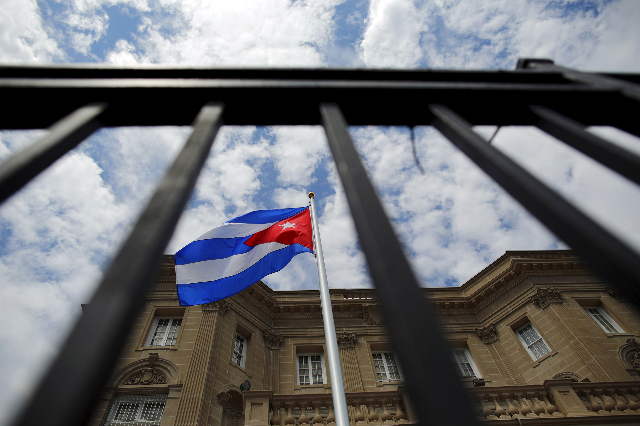Cuban flag flies again over Washington embassy

WASHINGTON — The Cuban flag was raised over Havana’s embassy in Washington on Monday for the first time in 54 years as the United States and Cuba formally restored relations, opening a new chapter of engagement between the former Cold War foes.
Cuban Foreign Minister Bruno Rodriguez presided over the reinauguration of the embassy, a milestone in the diplomatic thaw that began with an announcement by U.S. President Barack Obama and Cuban President Raul Castro on Dec. 17.
Serious differences remain between the United States and Communist-ruled Cuba, and efforts toward full normalization of ties are expected to proceed slowly. But the ceremony carried enormous symbolism after more than two years of negotiations between governments that had long shunned each other.
In a further sign of a desire to move past a half-century of enmity, Secretary of State John Kerry later hosted Rodriguez, the first Cuban foreign minister to visit Washington since the Cuban Revolution, for talks at the State Department.
While both men stressed the momentous occasion, they also sought to temper optimism fueled by the day‘s festivities.
"The historic events we are living today will only make sense with the removal of the economic, commercial and financial blockade, which causes so much deprivation and damage to our people, the return of occupied territory in Guantanamo, and respect for the sovereignty of Cuba," Rodriguez said at the reopening ceremony.
Kerry later hailed a "new beginning" in relations but said there was much that divided the two governments and that the path to full normalization may be "long and complex."
White House spokesman Josh Earnest told reporters the administration was "hopeful" that Cuba in coming years would start to show respect for basic human rights.
Earlier, a three-man honor guard marched onto the front lawn of the newly reopened embassy in Washington where the Cuban flag was hoisted while the Cuban national anthem played.
There were competing chants from the crowd outside the gates. "Cuba si, embargo no!" shouted one group. "Cuba si, Fidel no," yelled a much smaller contingent of counter-demonstrators.
Rodriguez then spoke at a reception inside the stately building, which was visited by revolutionary leader Fidel Castro just months after he seized power in Cuba in 1959.
MORE SUBDUED REOPENING IN HAVANA
In Havana, the U.S. Embassy was also reopened for business but with much less fanfare.
A crowd of about 100 Cubans, tourists and Cubans-Americans gathered in front, many clutching small U.S. flags. One Cuban held a banner that read, "Welcome USA."
Embassy staff flashed new badges and business cards, and the website, Twitter feed and Facebook page of the mission changed. The Stars and Stripes, however, will not be hoisted there until a visit by Kerry on Aug. 14.
In Washington, more than 500 people, including Obama administration officials, U.S. lawmakers and a large visiting Cuban delegation, attended the ceremony at the nearly century-old mansion. The U.S. delegation was headed by Assistant Secretary of State Roberta Jacobson.
Before dawn on Monday, workers hung the Cuban flag in the lobby of the State Department alongside the banners of other countries with which the United States has diplomatic relations.
"We‘ve waited a long time for this day," Senator Patrick Leahy, a staunch supporter of rapprochement, said as he entered the grounds of the Cuban Embassy.
No invitations went to hard-line anti-Castro lawmakers, such as Senators Marco Rubio and Bob Menendez, who oppose Obama‘s outreach and modest easing of restrictions on business and travel.
Republican presidential candidate Jeb Bush underscored his opposition to the diplomacy on Twitter on Monday: "Obama‘s rush to restore diplomatic relations with Cuba is wrong. This embassy will only serve to further legitimize repressive regime."
The opening to Cuba marked a major application of Obama‘s presidential doctrine of negotiating with enemies, a concept that now faces an even tougher test with a nuclear deal reached with Iran last week.
But the counterpoint to the restoration of ties is a long list of lingering disputes, as well as Havana‘s desire to keep a tight rein on Cuba‘s society and its state-run economy.
Cuba‘s main complaint is the longstanding embargo. It will remain in place, and only Congress can lift it, something majority Republicans are unlikely to do anytime soon despite Obama‘s appeal for it to be rescinded.
Havana also demands the return of the U.S. naval base at Guantanamo Bay, Cuba, something Washington has so far refused to discuss. Other problems include the two countries‘ outstanding legal claims against each other and Cuba‘s sheltering of American fugitives.